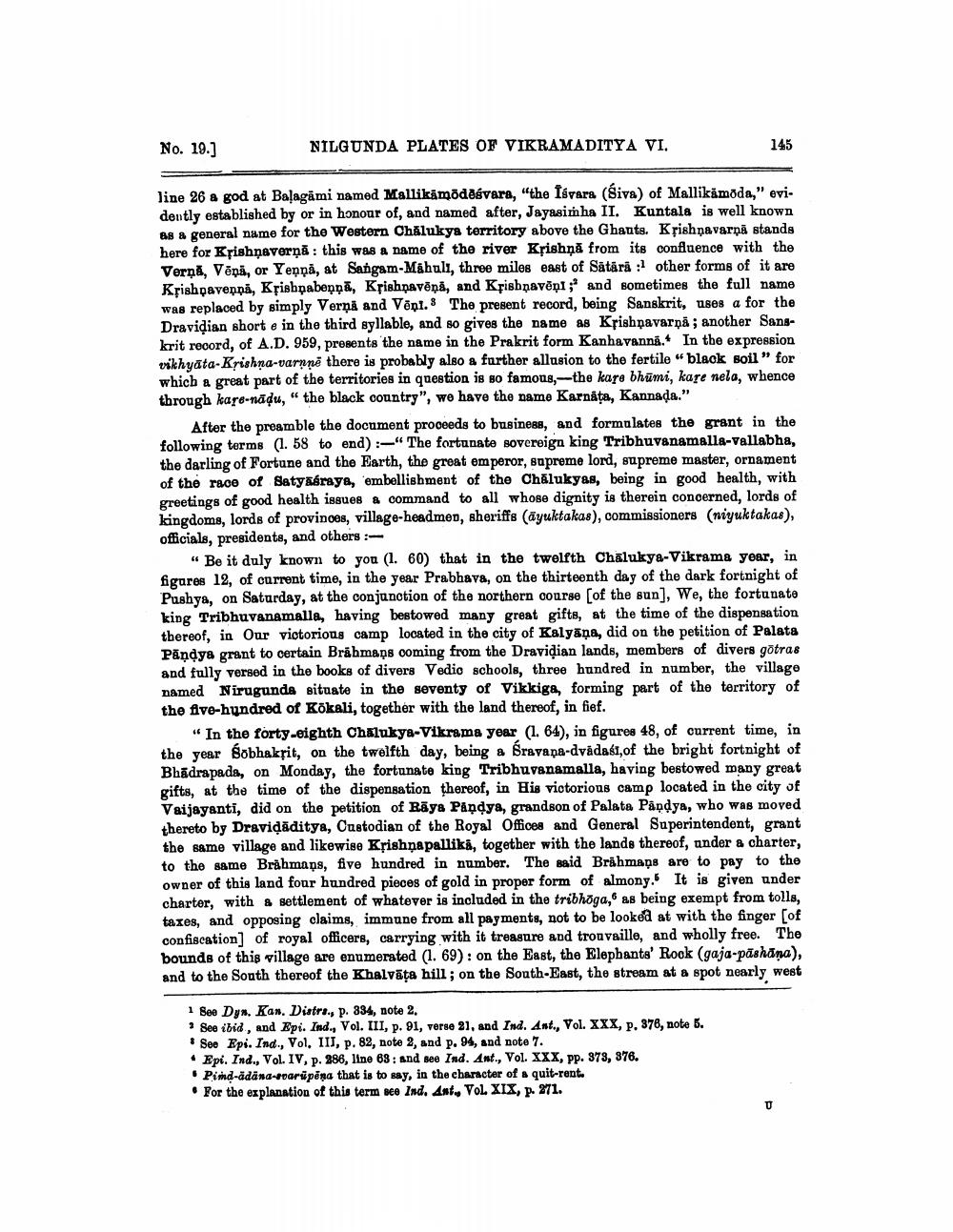________________
No. 19.]
NILGUNDA PLATES OF VIKRAMADITYA VI.
145
line 26 & god at Balagami named Mallikämödesvara, "the Isvara (Siva) of Mallikšmoda," evidently established by or in honour of, and named after, Jayasinha II. Kuntala is well known as a general name for the Western Chalukya territory above the Ghants. Kpishṇavarnā stands here for Krishnavorņa: this was a name of the river Krishni from its confluence with the Verna, Vēni, or Yenni, at Sangam-Mahuli, three miles east of Satara :\ other forms of it are Krishpavenpå, Kțishpabeņņā, Kțishnavēņi, and Krishnavēņi;' and sometimes the full name was replaced by simply Verņi and Vēņ1.8 The present record, being Sanskrit, uses a for the Dravidian short e in the third syllable, and so gives the name as Krishnavarnă; another Sanskrit record, of A.D. 959, presents the name in the Prakrit form Kanhavanns. In the expression rikhyata-Krishna-varnpo there is probably also a further allusion to the fertile "black soil" for which a great part of the territories in question is so famous,--the karo bhumi, kare nela, whence through kare-nādu," the black country", we have the name Karnāta, Kannada."
After the preamble the document proceeds to business, and formulates the grant in the following terms (1. 58 to end) :-" The fortunate sovereign king Tribhuvanamalla-Vallabha, the darling of Fortune and the Earth, the great emperor, supreme lord, supreme master, ornament of the race of Satyksraya, embellishment of the Chilukyas, being in good health, with greetings of good health issues & command to all whose dignity is therein concerned, lords of kingdoms, lords of provinces, village-headmed, sheriffs (äyuktakas), commissioners (niyuktakas), officials, presidents, and others :
"Be it duly known to you (1. 60) that in the twelfth Chalukya-Vikrams year, in figures 12, of current time, in the year Prabhava, on the thirteenth day of the dark fortnight of Pushya, on Saturday, at the conjunction of the northern course [of the sun], We, the fortunate king Tribhuvanamalla, having bestowed many great gifts, at the time of the dispensation thereof, in Our victorious camp located in the city of Kalyana, did on the petition of Palata Pandya grant to certain Bråbmans coming from the Dravidian lands, members of divers gotras and fully versed in the books of divers Vedic schools, three hundred in number, the village named Nirugunde situate in the seventy of Vikkiga, forming part of the territory of the five-hundred of Kokali, together with the land thereof, in fief.
"In the forty-eighth Chalukya-Vikrama year (1. 64), in figures 48, of current time, in the year Sobhakrit, on the twelfth day, being a Sravana-dvădasi,of the bright fortnight of Bhādrapada, on Monday, the fortunate king Tribhuvanamalla, having bestowed many great gifts, at the time of the dispensation thereof, in His victorious camp located in the city of Vaijayanti, did on the petition of RĀya Pandya, grandson of Palata Pandya, who was moved thereto by Dravidāditya, Custodian of the Royal Offices and General Superintendent, grant the same village and likewise Krishnapallika, together with the lands thereof, under a charter, to the same Brāhmaṇs, five hundred in number. The said Brahmaps are to pay to the owner of this land four hundred pieces of gold in proper form of almony. It is given under charter, with a settlement of whatever is included in the tribhoga, as being exempt from tolls, taxes, and opposing claims, immune from all payments, not to be look at with the finger [of confiscation] of royal officers, carrying with it treasure and trouvaille, and wholly free. The bounds of this village are enumerated (1. 69 : on the East, the Elephants' Rock (gaja-päshana), and to the South thereof the Khalvāta hill; on the South-East, the stream at a spot nearly west
1 Bee Dyn. Kan. Distr., p. 834, note 2. * See ibid, and Epi. Ind., Vol. III, p. 91, verse 21, and Ind. Ant., Vol. XXX, p. 378, note 5. * See Eps. Ind., Vol. III, p. 82, note 2, and p. 94, and note 7. • Epi. Ind., Vol. IV, p. 386, line 63: and see Ind. Ant., Vol. XXX, PP. 373, 376. • Pirmd-ädäna-roarüpana that is to say, in the character of quit-rento • For the explanation of this term see Ind. Ant. Vol. XIX, p. 271.




